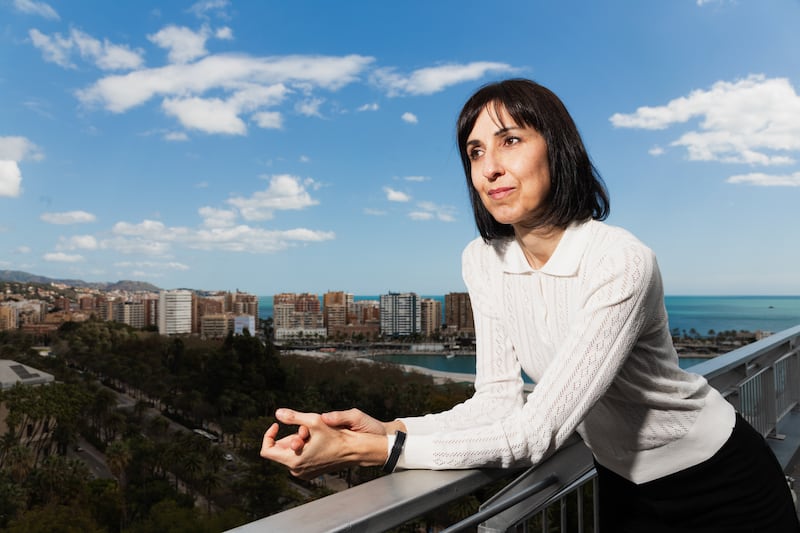When Eva Libertad set out to tell the story of a deaf woman navigating motherhood in a hearing world, she didn’t have to look too far for inspiration. Deaf, the director’s arresting new feature – winner of the audience award at this year’s Berlin International Film Festival – draws from a childhood spent with her deaf sister, Miriam Garlo, who lost her hearing as a child.
“There was a lot of tension growing up,” says Libertad, who is Spanish. “My sister was born hearing but lost her hearing at the age of seven. My parents knew something wasn’t right, so they took her for tests. But the doctors never said, ‘Your daughter is deaf.’ They just told my parents to put her in the front row at school and teach her to lip-read.”
The absence of early deaf-friendly guidance affected both Miriam and her family. Within the home, parents and siblings adapted. They learned to communicate face to face, to articulate carefully and to support Miriam in her learning and speech development. But the weight of navigating a hearing world without cultural supports fell largely on the deaf girl herself.
Despite these obstacles, Miriam pursued education, graduating from school and university. Still, a part of her identity remained unclaimed until she encountered the deaf community as a young adult.
“That was a turning point,” Libertad says. “She started learning sign language, and I did too, to accompany her. Miriam always says that, before discovering the deaf world, life was black and white. Learning sign language made the world full of colour.
“It sounds obvious to say, but when she came into contact with the deaf community she had a revelation: ‘Oh, I’m deaf.’ That was a turning point. For me, too, it was a moment to re-examine our relationship and what deafness means, not just for her but for us as a family.”
 Eva Libertad. Photograph: Patricia J Garcinuno/Getty
Eva Libertad. Photograph: Patricia J Garcinuno/Getty
This personal journey became the foundation for Sorda (Deaf in Spanish), a short film that Libertad directed with Nuria Muñoz in 2021. The film, which stars her sister in the lead role, explores a deaf woman’s anxieties about motherhood. It made quite a splash, screening at more than 150 festivals, winning 54 awards and earning a nomination at the Goya Awards, the “Spanish Oscars”.
“The short came from reality,” says Libertad. “Miriam was thinking about becoming a mother, and she told me all her fears. She gave me two pages of fears: emotional, practical, existential. It left a huge impression on me. That became the heart of the short film’s script.”
Libertad felt there was more to explore. She began developing a feature-length version, not as a direct continuation of her sister’s life but as an expansion of the themes. Miriam, who ultimately decided not to pursue motherhood, has returned to play Ángela, a fictional character inspired by real-life interviews and research.
“In my case, I found my creative place by focusing on the connection between the deaf and hearing worlds,” she says. “The film is told through the lens of this couple, Ángela and Héctor.”
The shared language, or lack of it, between Ángela and Héctor, her hearing partner, becomes a tense battleground for intimacy and independence. The prospect of motherhood to a child who can hear is daunting for the deaf heroine.
“I wanted to explore how relationships function across communication barriers,” says Libertad. “It’s not just about language. It’s about trust, identity and compromise. For Ángela, becoming a mother raises the terrifying question: what if my child isn’t like me?”
I wanted the film to be accessible for both deaf and hearing audiences. That meant no off-screen voiceovers, no unnecessary close-ups
— Libertad
Libertad spoke to a range of deaf mothers, collecting stories of pregnancy, childbirth and parenting. These testimonies were vital tools for shaping the film.
“All of the women I interviewed described the birth itself as traumatic,” she says. “Of course, birth can be traumatic for any woman, but for deaf mothers it’s compounded. In Spain there are no protocols in place: no guaranteed interpreters or communication support.”
In both the short and the feature, form follows function. Libertad’s choices as director were designed to prioritise clear and authentic communication suitable for deaf audiences. The camera rarely cuts to traditional close-ups; instead, wide, fixed frames dominate, giving the viewer full access to the characters’ bodies and hands as they sign.
“I wanted the film to be accessible for both deaf and hearing audiences,” says Libertad. “That meant no off-screen voiceovers, no unnecessary close-ups. When I explained this to my cinematographer, Miriam Fedele, she was shocked. She asked, ‘How will we do this without traditional coverage?’”
They made it work.
“For deaf people, the eyes are the ears,” says Libertad. “So we kept the camera at eye level. And in the final part of the film we shift fully into Ángela’s point of view. The actors begin interacting with the camera as if it were Ángela. We even lit the camera lens to guide their eye lines.”
Though grounded in the deaf experience, Deaf has found unexpected resonance among hearing women, particularly around themes of motherhood.
“What has surprised me most is how many hearing mothers have written to me saying they saw themselves in Ángela,” says Libertad. “They understood her fear, her isolation, her uncertainty. That kind of identification goes beyond deafness.”
This is a landmark year for new deaf cinema. In May the stirring documentary Deaf President Now! – directed by the activist Nyle DiMarco alongside Davis Guggenheim – recounted the inspiring eight-day protest at Gallaudet University in 1988, at which students successfully demanded a deaf president.
Upcoming titles include The Way We Talk, Adam Wong’s depiction of three deaf friends considering cochlear implants and assimilation in a hearing-dominated Hong Kong, and Ted Evans’s Retreat, the first thriller to feature an all-deaf cast and to be shot entirely using British Sign Language. Flash Before the Bang will tell the inspiring story of an all-deaf high-school track team.
On television, Code of Silence, on ITV, featured Rose Ayling‑Ellis’s lip-reading heroine, and the BBC’s Reunion explored how the justice system fails the hard of hearing.
“I would love to see many more films about deafness,” says Libertad. “I’d love to see deaf directors behind the camera, telling their stories of deaf people. My creative starting point was to focus on the connection between the deaf and hearing worlds.
“One of the problems with the under-representation of certain aspects of the world or certain types of people is that the films become a reference rather than standing on their own merit. People still think of Coda and Children of a Lesser God because that’s the only reference they have for deaf films.”
Miriam Garlo, who reprises her role as Ángela in the feature, was deeply involved in the project. As Libertad wrote the script, she regularly sent her sister drafts, for feedback, not only as an actor but as a script adviser.
“There were moments where I’d ask Miriam, ‘How would Ángela react here?’ And she’d guide me. She was incredibly supportive throughout the entire process.”
Watching the finished film together for the first time was emotional for both sisters – and, later, for their parents.
“We watched it at home on my projector,” says Libertad. “It hadn’t gone through final postproduction yet, but I wanted them to see it.
“My parents found it really hard to watch the first scene. They saw things they recognised, and things they had never realised before. They told me, ‘We never knew Miriam suffered like this.’
“And that has been true for many viewers. I’ve received messages from parents of deaf children saying the film helped them understand their own child better.”
Deaf may have started as a personal project, but it has grown into a larger conversation. For Libertad, that’s exactly the point.
“This film has helped me review and renew my relationship with my sister,” she says. “I hope it helps others do the same: to see, to understand, and to connect.”
Deaf is on limited cinema release

